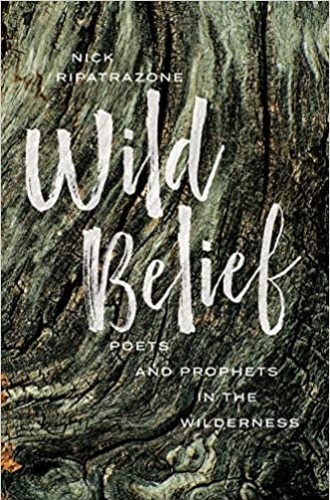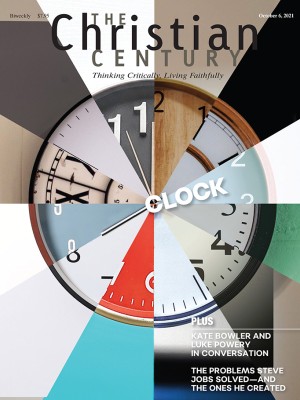Literature in the wild
Nick Ripatrazone invites us into the wilderness with some of his favorite writers.
Every morning I walk a few miles in my neighborhood, drinking in the sounds of crows and songbirds, sometimes seeing deer, and occasionally spotting a fox. But the low growl of traffic reminds me I live in the suburbs, not a wilderness. Homeowners in my development try to control nature, artfully mixing butterfly bushes, crepe myrtles, and hydrangeas among oak trees, dogwoods, and magnolias. Chemicals keep the non-native grass green and kill mosquitoes in the summer. When we say someone’s yard looks wild, it’s an insult. Still, slivers of wilderness exist in pockets, behind and between some houses, and laws about native Virginian wetlands prohibit taming such areas.
Nick Ripatrazone, who lives in America’s most densely populated state, New Jersey, writes powerfully about wilderness in his latest book. Wild Belief touches on biblical concepts, including wilderness as a place of testing and transformation, but focuses on poets and writers, including Gerard Manley Hopkins, Thomas McGuane, W. S. Merwin, and Mary Oliver. “Poets and prophets, united by imagination, capture the transcendent sublimity of the wilderness,” Ripatrazone asserts. “Unconcerned with intellectual theories, they capture emotion.”
Read our latest issue or browse back issues.
Ripatrazone describes the elusive idea of wilderness, which was not a concept in Paleolithic times but permeates the Bible. Wilderness became especially important to Americans during the beginning of the pandemic as people flocked to parks and trails, eventually creating gatherings so large that they led to closures. “Thoreau was right: we need the tonic of wildness,” Ripatrazone observes.
The introduction and first chapter circle around themes of prophecy and temptation, focusing primarily on John the Baptist and Saint Anthony, with a few other Desert Fathers sprinkled in alongside Henri Nouwen, Thomas Merton, and Gustave Flaubert. Flaubert may be best known for Madame Bovary, but he also wrote a novel-play about Anthony, which Ripatrazone describes in some detail. Ripatrazone also writes about the medieval tradition of “the wild man,” who was not born of the wilderness but evolved there. And he evokes the essayist Richard Rodriguez’s intriguing ideas about the desert being essential—and even intertwined with God—in Christianity, Judaism, and Islam. In these pages the desert offers transcendence and transformation in addition to temptation.
Ripatrazone profiles many prophets throughout the book, most of whom are modern people instead of biblical figures. I would have loved to see sustained treatment of the Old Testament prophets. But dozens of other books do that, whereas this one convincingly reveals essayists and poets as prophets. Ripatrazone explains that these writers “do not share a unified vision of the wilderness because the wilderness rejects classification.”
I was especially taken by a chapter called “Stewards of the Gloriously Indifferent,” which is devoted to Wendell Berry and Terry Tempest Williams. Berry advocates for sections of wilderness among domesticated spaces, “‘sacred groves—places we respect and leave alone, not because we understand well what goes on there, but because we do not.’” He also advocates for reading the Bible outdoors, a practice I wholeheartedly endorse. Berry’s Kentucky wilderness differs from Williams’s Utah desert, which she describes as “harsh, brutal beauty of skin and bones.” Williams’s Mormon faith further colors her writing, and she describes herself as “raised to believe in a spirit world.” Ripatrazone observes that wilderness heals us by helping us be aware of our bodily limitations in the wild.
Although a few pages in the conclusion discuss Toni Morrison and the role of wilderness in Beloved as a place of resurrection and renewal, the principal writers featured in this book are all White. I would have appreciated a chapter devoted to some indigenous poets and prophets whose writing and worldview interacts with the wilderness.
Wild Belief leans academic, with some chapters more beautifully crafted than others. Ripatrazone weaves together writers with theology, sometimes so densely that I had to read portions multiple times to keep the players straight. Given the breadth of works referenced, I was grateful for the inclusion of an index. English majors with a passion for theology: this work of criticism primarily concerned with other writers’ words is for us.







